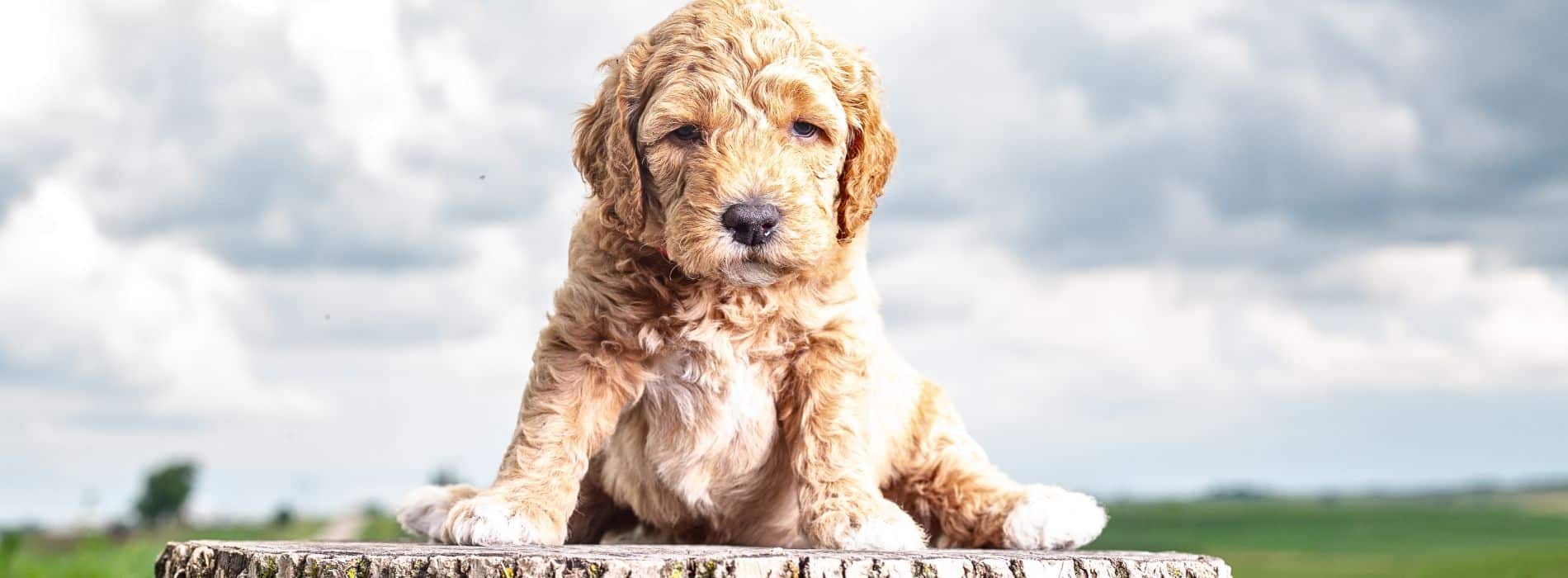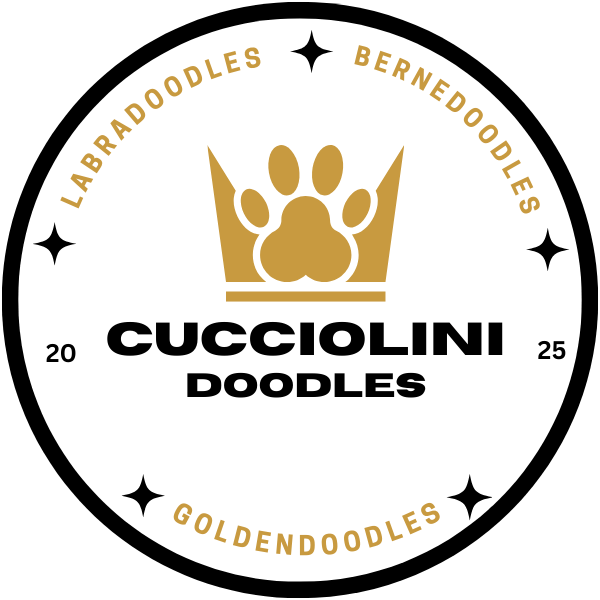Tips for Bringing a Labradoodle Puppy Home: “Getting Ready for Your New Labradoodle Puppy!”
What is an F1B Labradoodle, and Why Choose this Breed? The F1B Labradoodle is a specific type of Labradoodle breed known for its unique characteristics and qualities. It is a cross between a first-generation Labradoodle (F1) and a purebred Poodle, resulting in a 75% and 25% Labrador Retriever dog.
Lovable Loyal Companions
These lovable Labradoodles are known for being hypoallergenic, producing fewer allergens than other breeds. Add an F1B Labradoodle Puppy to your family and enjoy the companionship without worrying about pesky allergies. Their curly or wavy coat helps to minimize shedding, reducing the amount of dander in the environment.
In addition to being hypoallergenic, F1B Labradoodles often inherit the intelligence and trainability of both the Poodle and Labrador Retriever breeds. If you’re looking for a dog that is easy to train and loves to please, look no further. Labradoodles are intelligent and can be easily trained for obedience or dog sports. With their exceptional intelligence and willingness to follow commands, you’ll have a loyal and obedient companion.
Labradoodle Puppy & Children
F1B Labradoodles are friendly, pleasant, and great with children and pets. They have an affectionate nature and enjoy being part of a family environment. If you love to be outdoors and active, you’ll find no better companion than these playful creatures. They’re the perfect addition to any family or individual seeking an adventurous, fun-loving companion.
Overall, if you are looking for a hypoallergenic dog with intelligence, trainability, and an affectionate nature, the F1B Labradoodle may be an excellent choice. However, due to their mixed lineage, individual dogs within this breed can vary in temperament and characteristics.
Preparing Your Home for Your Furry Friend
Getting Ready for Your New Labradoodle Puppy
Preparing for the arrival of a new puppy involves careful planning and setting up the right environment. It includes selecting essential products such as crates, beds, food and water bowls. Choosing healthy puppy food that provides the necessary nutrients is crucial, and consulting with a veterinarian can help make the right choice. By taking these initial steps, you can ensure your new furry friend has everything they need for a comfortable and healthy start in their new home.
Before puppy arrival, there are a few steps to consider as well as rules to set; they consist of when training:
Begin with the best products. Your new puppy will need a crate, bed, food, and water bowls. Selecting healthy puppy food is essential to ensure the puppy receives the proper nutrients.
What is the list of food and accessories your new dog needs?
Find out more about the puppy’s age and stage before selecting the best food for proper nutrition.
1. Puppy Pet Food
To avoid tummy troubles, begin by feeding your brand-new pet the brand they were consuming before coming to your residence. After that, you can slowly switch to one more puppy food, relying on your vet’s recommendations. Gradually transitioning your new pet to a different puppy food, under your veterinarian’s guidance, can help prevent digestive issues and ensure a smooth adjustment to their new diet.
2. Food and Water Bowls
Choosing the right dog food and water bowls is paramount when providing the best care for our furry friends. These essential accessories are crucial in ensuring our pets’ health and well-being. By selecting high-quality bowls appropriate for our beloved dogs’ breed and size, we can promote proper nutrition, hydration, and overall comfort.
3. Puppy Collar
A collar is an essential safety and security accessory for dogs during outdoor excursions. It is designed to hold the dog’s ID tag, which includes their name and contact information, providing a safeguard if they go astray. Additionally, it carries any health and wellness tags required by your local city or region, ensuring compliance with regional regulations.
4. Leash
When taking your puppy for a relaxing outdoor stroll, you must equip yourself with a reliable and conventional 6-foot leash. This specific leash length ensures that your beloved pup remains close by and secure, allowing you to observe and understand its outdoor habits closely. The 6-foot leash provides your pup with the perfect balance of freedom while maintaining control and ensuring their safety during these enjoyable outings.
5. Puppy Poop Bags
Leaving your pet’s waste on the ground goes beyond being simply rude; it poses a serious public health threat. It is crucial to prioritize the well-being of your community and environment by taking responsibility for properly disposing of your pet’s waste. Ensuring that you pick it up and place it in a designated Poop Bag is not only considerate but also essential in preventing the spread of harmful bacteria and parasites. Moreover, it is important to note that pet waste can be toxic to anyone who inadvertently comes into contact with it. Whether someone is walking on the sidewalk or children are playing in a park, stepping on pet waste can lead to serious health risks. The bacteria and pathogens in feces can easily be transported into homes, potentially causing contamination and illness. By diligently picking up after your pet and disposing of their waste appropriately, you demonstrate responsible pet ownership and contribute to a cleaner and safer environment. Remember, protecting our communities from this potential health hazard requires collective effort!
6. Puppy Treats
When training your beloved puppy or simply expressing affection towards them, it is crucial to begin with a pet dog reward that will motivate and engage them. It is recommended to choose treats containing only one ingredient to lower the risk of triggering allergies or sensitivities. By carefully selecting treats with minimal ingredients, you can provide your furry companion a safe and enjoyable experience during their training sessions or moments of affection.
6. Bed
Creating a cozy area for your new puppy is essential to help them feel secure and settle into their new home. Choosing a quiet spot where their bed can be placed is important, away from noise or distractions. Dogs, like humans, cherish having their own space to retreat and relax. You are creating an environment that promotes their well-being and comfort by providing a designated peaceful and secure area.
7. Puppy Toys
It is widely recognized that all puppies, regardless of breed or size, have a natural need for toy play, which provides them with mental stimulation and aids in their physical development. Engaging in playful activities such as eating, chasing, or cuddling helps puppies explore their surroundings, develop essential cognitive skills, and build strong bonds with their human companions. Owners can ensure their puppies receive the necessary physical and mental exercise by incorporating regular play sessions into their routines to support optimal growth and well-being.
8. Trimmers
Clippers, specifically designed for trimming your family pet’s nails, are essential in maintaining their overall health and well-being. These specialized clippers can efficiently trim the nails and ensure the process is comfortable and safe for your beloved pet. Using these clippers regularly lets you keep your pet’s nails at an optimal length, preventing any discomfort or potential injury from excessively long nails. It is important to note that regular nail maintenance with these clippers can help avoid issues such as ingrown nails or painful splits, ensuring a happy and healthy life for your furry friend.
9. Dog Crate
A crate serves multiple purposes when bringing a new puppy into your home. It provides a safe and secure area that your furry friend can call their very own, and it is also an essential tool for crate training. Crate training is a popular method dog owners use to establish boundaries and teach their puppies good behaviour. Creating a designated area for your puppy can provide comfort and help improve their sleep patterns.
Moreover, using a crate during the training process can assist in housebreaking, as puppies naturally avoid soiling their sleeping areas. It is important to choose a crate that gives your puppy enough space to stand up, turn around, and lie down comfortably while also allowing for growth.
10. Potty Pads
Proper house training is essential to owning a dog and ensuring a clean and hygienic environment. While potty pads can help protect your flooring from accidents, training your dog to eliminate in an outdoor area is generally recommended. This approach promotes better sanitation, helps establish a routine for your furry friend, and reinforces their understanding of appropriate bathroom behaviour. By training your dog outdoors, you also encourage them to associate elimination with outdoor spaces, minimizing indoor accidents in the long run.
11. Chew Toys
Many options are available to provide your precious puppy with a suitable and enriching chewing experience. One highly recommended choice is the Kong toy. The Kong toy is designed to meet dogs’ natural chewing instincts, making it an excellent option for your puppy’s playtime. This chew toy is safe and non-toxic for your pet, and it is made from all-natural materials to ensure durability.
Additionally, the Kong toy offers various sizes and textures to cater to different breeds and ages of dogs. With its interactive design, this chew toy provides mental stimulation while promoting good dental health by helping clean your puppy’s teeth. So, when searching for a suitable chew toy for your puppy, consider the Kong a reliable and enjoyable option that will keep them entertained for hours!
12. Treat-Dispensing Toys
Setting a designated and structured playtime for your young puppy can have significant psychological benefits. Not only does it provide them with mental stimulation, but it also helps keep them occupied and out of potential danger. Establishing a regular play schedule creates a positive routine that contributes to their overall well-being.
This dedicated time allows for supervised play, promoting healthy development and strengthening your bond with your furry companion. Furthermore, scheduling play sessions can help establish boundaries and reinforce good behaviour by redirecting their attention towards appropriate activities, ultimately creating a harmonious environment for your puppy and yourself.
13. Training Treats
Bite-sized, low-calorie treats are made particularly for training, and they allow you to reward your dog’s progress. One Active Ingredient Puppy Treats are the best.
14. Pet Dog Remote Control
This innovative training tool utilizes cutting-edge technology to create an audio feedback system that helps pets understand and recognize when they have successfully performed a desired behaviour. By combining the use of a dog remote control, this tool allows pet owners to communicate positive reinforcement to their furry companions effectively. It enhances training and strengthens the bond between pets and their owners, promoting a positive and rewarding learning experience.
15. Dental Products
Dental hygiene is just as important for our furry friends as it is for humans. To ensure our beloved pups’ well-being, specialized toothbrushes and toothpaste products are available, specifically designed to cater to their dental needs. These products are essential in helping our dogs get accustomed to regular teeth cleaning and protecting them against common dental issues they may face. By incorporating these dedicated dental products into our pets’ routine, we can promote good oral health and prevent potential dental problems from arising in the long run.
16. Young Puppy Shampoo
When choosing a shampoo for your brand-new young puppies, selecting a product that provides them with a gentle and mild scrub while meeting their specific needs is crucial. Puppies have delicate skin and fur that require extra care and attention. Look for shampoos specifically designed for puppies, as these formulations are often milder and gentler than regular dog shampoos.
Additionally, opt for shampoos free from harsh chemicals or artificial fragrances, as these can potentially irritate sensitive skin. Remember, your puppy’s health and happiness are your top priority. That’s why it’s crucial to seek guidance from your veterinarian before making any decisions about your furry friend’s grooming routine. Their professional knowledge and experience guarantee that your puppy gets the highest care possible.
17. Spot and Odour Remover
Accidents are inevitable when raising a young puppy, but specially designed urine or waste cleaners can effectively tackle the mess they create. These specialized cleaners are specifically formulated to eliminate odours and stains that may result from puppy accidents, making them an essential tool for any pet owner. With their powerful cleaning properties, these cleaners ensure that your home remains fresh and clean while also helping to prevent repeat accidents in the same spot.
18. Calming Aids
Make the transition to your home smoother for your new puppy by incorporating natural supplements into their routine. These supplements help them feel comfortable and at ease in their new environment. One option is to use a dog collar infused with calming sprays, providing a sense of security and relaxation.
Consider using anxiety-settling aids such as pheromone diffusers and essential oil blends designed to reduce stress and promote calmness. With these tools, you can help your furry friend feel more at ease and comfortable in their environment.
Welcome Home: Creating a Safe and Comfortable Environment for Your Labradoodle Puppy
Creating a safe environment for your Labradoodle puppy is essential for its well-being and happiness. One of the first steps in puppy-proofing your home is to set up a designated area for them to play and rest. A puppy playpen or gated area can provide a secure space to move freely without getting into any potential hazards.
In addition to the play area, it’s crucial to establish a designated potty area for your Labradoodle puppy. It can be a specific spot in your yard or even an indoor patch of artificial grass. Consistency is key in potty training, so having a designated place will help your Labradoodle puppy understand where to go.
Providing your Labradoodle with safe toys and chewables is important to keeping them entertained and engaged. Look for toys specifically designed for puppies, usually made with softer materials that won’t harm their teeth and gums. Avoid toys with small parts that could be swallowed or pose a choking hazard.
Remember to supervise them closely during their early stages of exploration and gradually introduce new areas of the house as they become more familiar with their surroundings.
Feeding and Nutrition Tips for Your Labradoodle Puppy’s Health
Here are some Step-by-Step feeding and nutrition tips for your Labradoodle puppy’s health:
Puppy Food Selection:
Choose a high-quality Royal Canin Puppy Food specifically formulated for the nutritional needs of growing Labradoodles. Look for brands with real meat as the first ingredient and avoid artificial additives or fillers. It is essential to feed your Labradoodle with high-quality Royal Canin Puppy Food, specifically formulated for their nutritional requirements.
1. Feeding Schedule
Creating a consistent feeding routine for your puppy is crucial. It helps in maintaining health and well-being. Until your puppy reaches the age of six months, they should be fed two to three times a day. After six months, you can reduce the frequency to two daily meals. A regular feeding schedule can give your puppy the necessary nutrients and encourage healthy eating habits.
2. Portion Control
Follow the recommended portion sizes on the puppy food packaging based on your Labradoodle’s age, weight, and activity level. Avoid overfeeding, as it can lead to obesity and other health issues. Maintaining a balanced diet for your Labradoodle is crucial to prevent obesity and other health problems, taking into account age, weight, and activity level.
3. Treats and Rewards
Use treats to reward good behaviour during training sessions or as occasional snacks. Opt for healthy treats made specifically for puppies, avoiding those high in sugar or artificial ingredients.
By following these steps, you can ensure that your Labradoodle puppy receives proper nutrition and maintains good overall health throughout their growth. Providing your Labradoodle puppy with nutritious treats and following a balanced diet will contribute to their overall health and well-being as they grow.
The Importance of Socialization and Training from a Young Age
4. Socialization and Training
They are crucial for puppies’ overall development and well-being from a young age. Puppy socialization classes play a vital role in exposing young dogs to various experiences, people, and other animals. These classes provide a safe environment for puppies to learn how to interact with others, build confidence, and develop important social skills. Proper puppy socialization classes are essential for young dogs’ healthy development and well-being, as they provide valuable opportunities for exposure to different experiences, people, and animals, ultimately helping them learn how to interact, build confidence, and develop crucial social skills.
5. Basic Obedience Training
It’s another essential aspect of early puppy training. Teaching commands such as sit, stay, and come establishes boundaries and ensures the safety of the puppy and those around them. Positive reinforcement techniques are highly recommended during training sessions as they promote a healthy learning environment by rewarding desired behaviours rather than punishing unwanted ones.
In conclusion, early puppy training is crucial in establishing boundaries and ensuring the puppy’s safety and that of those around it. Teaching commands like sit, stay, and come sets clear expectations and promotes a positive learning environment. Using positive techniques, such as rewarding desired behaviours, trainers can effectively shape their puppies’ behaviour without punishment. It is important to prioritize early training to lay a solid foundation for future obedience and socialization.
Grooming Essentials: Keeping Your Labradoodle’s Coat Healthy and Tidy
Grooming is essential to keeping your Labradoodle’s coat healthy and tidy. Regular brushing and bathing are key to maintaining their coat’s appearance and overall well-being. However, it is important to note that the grooming needs of Labradoodles can vary depending on their coat type, which can be either curly or wavy.
1. For Labradoodles with Curly Coats
Brushing them at least once daily using a slicker brush or comb with wide-spaced teeth is recommended; it helps prevent curl matting and tangling. Start from the roots and gently work through the entire coat, ensuring you reach down to the skin. Regular brushing also helps distribute natural oils throughout the fur, keeping it healthy and shiny. Regular brushing with a slicker brush or wide-spaced comb is essential to prevent matting and tangles and maintain a healthy and glossy coat.
2. Labradoodles with Wavy – Shaggy Fleece Coats
Wavy – Shaggy Fleece Coats require slightly less frequent brushing than their curly-coated counterparts. Brushing them at least two to three times weekly using a slicker or pin brush is generally sufficient. Focus on removing loose hair and tangles while ensuring you are gentle. Regular brushing of wavy and shaggy fleece coats, at least two to three times a week using a slicker brush or pin brush, helps to maintain their appearance by removing loose hair and tangles.
3. Bathing Schedule
Labradoodles typically require bathing every 6-8 weeks or as needed. When bathing your Labradoodle, it’s important to use a mild dog shampoo formulated for sensitive skin. Overbathing your Labradoodle can cause dryness and irritation, so it is important to employ a gentle shampoo to avoid stripping away natural oils from their coat.
Labradoodles, a popular crossbreed between Labrador Retrievers and Poodles, require regular bathing to maintain their hygiene and overall health. Generally, it is recommended to bathe Labradoodles every 6-8 weeks or as needed. However, over-bathing can have negative effects on their coat.
4. Frequent Washing
Keeping your furry friend clean is important, but overwashing can do more harm than good. Regular shampoos can strip natural oils from your Labradoodle’s fur, leading to dryness and irritation. That’s why using a mild dog shampoo specifically formulated for sensitive skin is crucial. These shampoos are prepared to be gentle on your pet’s skin and help maintain the natural oils to promote a healthy and shiny coat. Keep your Labradoodle looking and feeling their best with a gentle, effective shampoo.
5. Using a Shampoo Made for Sensitive Skin
Sensitive Skin Shampoo also reduces the risk of potential allergies or irritations that Labradoodles may be prone to. Choosing a product that does not contain harsh chemicals or fragrances that could cause discomfort for your furry friend is important. In addition to using the right shampoo, it is essential to follow proper bathing techniques for Labradoodles. It includes:
Thoroughly wet their coat before applying shampoo.
Massaging gently with your hands or a soft brush.
Rinsing thoroughly.
Ensure all traces of shampoo are removed.
Using a sensitive skin shampoo and following proper bathing techniques can help your Labradoodle feel comfortable and well-being while reducing the risk of allergies or irritations.
By following these guidelines and taking care of your Labradoodle’s bathing needs appropriately, you can help maintain their coat’s health while avoiding any potential skin issues or discomfort. Each Labradoodle may have unique grooming requirements based on activity level, environment, and individual coat characteristics. Regular grooming sessions keep your Labradoodle looking great and improve their comfort and health. Proper grooming and regular maintenance are essential for keeping your Labradoodle’s coat healthy, preventing skin issues, and ensuring overall well-being.
Vet Visits and Health Care: Keeping Your Labradoodle Puppy Happy & Healthy
In conclusion, maintaining the happiness and health of your Labradoodle puppy requires a proactive approach. It includes adhering to a vaccination schedule, scheduling regular check-ups with the veterinarian, and taking preventative measures against common health issues. Additionally, considering puppy insurance options can provide added peace of mind in case of unexpected medical expenses. By prioritizing these steps, you can ensure your Labradoodle puppy receives the necessary care to thrive and lead a happy life.
Conclusion:
Proper preparation for the arrival of your new F1B Labradoodle requires careful planning and consideration. This guide ensures you are fully equipped to provide your furry friend with a loving and nurturing environment.
One of the first steps in getting ready is gathering all the necessary supplies. These include a comfortable bed, food and water bowls, toys for mental stimulation and exercise, grooming tools, and appropriate collars or harnesses. It is important to choose quality products that are safe and suitable for your Labradoodle’s needs.
Researching training techniques and tips can greatly benefit you and your new puppy. Consistency is key in training, so establishing routines early will help set expectations and promote good behaviour. Positive reinforcement methods are highly recommended as they encourage desired behaviours through rewards rather than punishment.
Lastly, remember the importance of socialization. Exposing your F1B Labradoodle puppy to various environments, people, animals, sights, and sounds will help them develop into well-rounded dogs with good manners. Puppy socialization classes or playdates with other friendly dogs can be great opportunities for them to learn how to interact appropriately.
By taking these steps outlined in this ultimate guide seriously and being proactive in preparing for your new F1B Labradoodle puppy’s arrival, you will be setting yourself up for success in building a strong bond with your furry companion while ensuring their health and happiness throughout life’s journey together.













